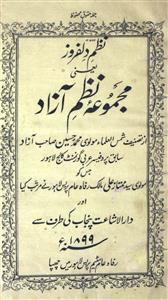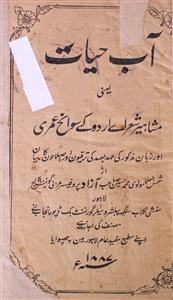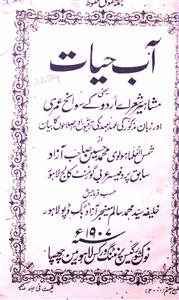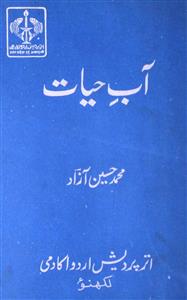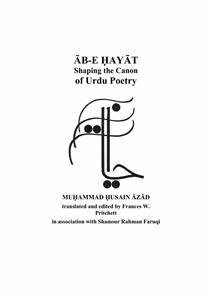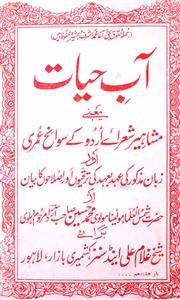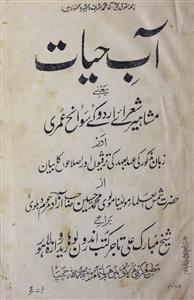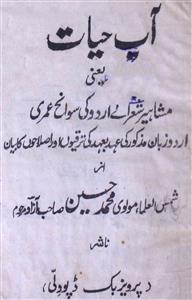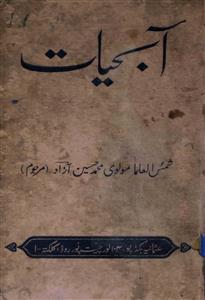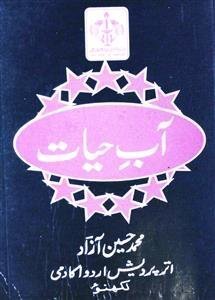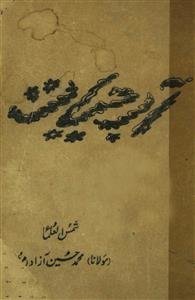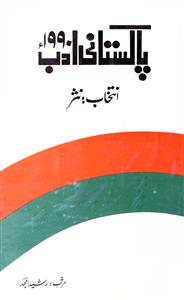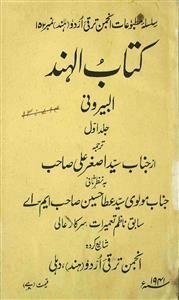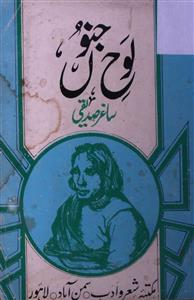 For any query/comment related to this ebook, please contact us at haidar.ali@rekhta.org
For any query/comment related to this ebook, please contact us at haidar.ali@rekhta.org
About The Book
مجموعہ" نظم آزاد"جدید اردو نظم کے بانی اور مجدد محمد حسین آزاد کے نظمیہ کلام پر مشتمل ہے۔نظم نگاری اور نیچرل شاعری کی ابتدا آزاد نے ہی کی۔آزاد نے فطرتا شاعرانہ طبعیت پائی تھی۔جدید شاعری کی بنیاد ڈالتے ہوئے اردو شاعری کو گل و بلبل او رحسن و عاشقی کے چکر سے نکالنے والے آزاد نے قدرتی موضوعات پر نظمیں لکھی۔اس طرح موضوعاتی نظم نگاری کا آغاز ہوا۔جدید رنگ میں ان کی چھوٹی چھوٹی نظمیں اور مثنویاں پر اثر اور معنی خیز ہیں۔سب سے پہلے کرنل ہالرائیڈ کی ایما پر ایک ادبی انجمن میں آزاد نے اپنی پہلی نظم "شب قدر" پیش کی تھی۔زیر نظر مجموعے کاآغاز بھی اسی نظم سے ہورہا ہے۔ قدرتی حسین مناظر ،دلکشی اور رعنائی ان نظموں کے موضوعات ہیں۔ان کی مشہور مثنویوں اورنظموں میں گنج قناعت، داد و انصاف ، وداع انصاف،خواب امن،مبارکباد، سلام علیک، معرفت الہی ،محنت کرو، الوالعزمی وغیرہ اہمیت کی حامل ہیں۔زیر نظر مجمو عہ آزاد کی نیچرل شاعری اور جدید نظم کا حسین آئینہ ہے ۔جس میں آزاد کی شستہ اور شگفتہ زبان ، جدید موضوعات کا عکس جھلک رہاہے۔ آزاد کا مشہور لکچر "خیالات نظم اور کلام موزوں کے باب میں" میں بھی اسی مجموعے میں شامل ہے۔
About The Author
One of the very well-oriented and highly spirited intellectuals in Urdu literary history, Mohammad Hussain Azad has come to stay as an iconic figure. He did not only evolve new parameters of literary historiography and criticism, and lay the foundations of modern prose style but also contributed towards the birth and growth of the Urdu nazm which had so far languished as merely a mode of expressing the romantic thought in traditional forms. Further to these, Azad created a condition for the poets to express themselves on certain given topics and recite their works in the open space of mushairas in order to reach out to larger sections of people in general. He came up with a refreshing thesis on the origin of the Urdu language and argued that Braj Bhasaha was, in fact, the source from where Urdu grew and acquired a distinct identity of its own. As an enlightened critic who developed a lively mode of discourse, he made a case for drawing upon other sources, especially English, to strengthen the tradition of Urdu language and literature. He affected a positive change in Urdu nazm by making it realistic and contemporaneously relevant.
Mohammad Hussain Azad was born on 05 September, 1830, at Delhi. His father, Maulavi Mohammad Baqar, who suffered death sentence on the charge of promoting hatred against the British and killing Mr. Taylor, was the editor of the first Urdu newspaper called Dehli Urdu Akhbaar to be published from north India. He owned a printing press, an Imambada, and a sarai. Azad’s mother who had a Persian lineage passed away when he was only four years old. Subsequently, he was brought up by his father’s sister but she too passed away soon. Hussain was badly affected by all these deprivations in his early life.
Azad was still a student at Dehli College when India’s condition as a British colony started deteriorating at a faster pace. At a personal level, he bore many a brunt. His father had already been arrested and he was finding it too difficult to sustain himself as a growing young man. He had no option but to remain in hiding and seek refuge at odd places. He passed a period of over two years in great difficulty and suffered extreme miseries. He lived for a short period with his distant family relatives at Lucknow. Later, he shifted to Lahore where he found a job as a record keeper at the General Post Office. After working there for three years, he got another employment at the office of the Director, Public Instructions. Ultimately, fortune smiled on him when Anjuman-e-Punjab was established at Lahore. With Dr. Lion’s care and concern for him, Azad was appointed as its Secretary. This was the right place for him to work towards the realization of his aim of constructing and disseminating knowledge with complete dedication. He was later appointed as Professor of Urdu and Persian at Government College, Lahore, as a temporary faculty but he was subsequently confirmed on this position.
With his appointments at the right places, Azad got mental peace and he could doggedly pursue his scholarly interest for which he was actually made. He also travelled through Central Asia which gave him an opportunity to enrich himself with better understanding of literature and culture. This afforded him a chance to record his experiences acquired from his long distance travels. Sair-e-Iran is one of his travelogues that bears it out quite well as it represents his sweet and sour memories of the land of Sheikh Sadi and Khwaja Hafiz.
Mohammad Hussain Azad enriched Urdu literature in such a broad-based manner that none could ever do like him. His works like Sukhan Daan-e-Faras, Qasas-e-Hind, Darbaar-e-Akbari, Nigaaristan-e-Faras, Diwan-e-Zauq, and Nairang-e-Khayal are his major contributions to literature, history and culture. Apart from these scholarly works, Azad also worked towards curriculum development which deserve special mention and make him a true scholar with larger commitments. His books concerning Urdu syllabi that include Urdu ki Pehli Kitab, Urdu ki Doosri Kitab, and Urdu ki Teesri Kitab have served several generations of Urdu language and literature learners. Azad, is, however, widely respected for his classic work entitled Aab-e-Hayat which, apart from being a history of Urdu literature, is also a memoir, as well as a treatise on the origin and development of Urdu language. It reads like a dialogic text and retains the readers’ interest from page to page. Known for its linguistic freshness and treatment of the subject, this book also serves as the first major work of lasting nature. This book is a great testimony of his genius and serves as a major source of reference till this day. An iconic prose stylist, critic, researcher, and travelogue writer, Azad’s importance also lies in his role as a poet and poet-mentor as he paved the way for Urdu poets to identify their subjects and develop their idiom.
It is sad that a scholar and littérateur of his stature miserably suffered on account of his health and became rather wild in his behavior in the later part of his life. With the demise of his wife during this period, he suffered another blow that added to his worsening medical condition. He met his end on 22 January, 1910 at Lahore and lies buried near Daata Ganj. Azad had started his career opposing the British government and wrote strong articles against them in his father’s newspaper. It is both strange and ironical that the British administrators, who had once killed his father for his opposition to the British rule, also restored Azad later in a big way and made him immortal. They conferred the title of Shams-ul-Ulema on him to acknowledge their appreciation for this man of genius.
 For any query/comment related to this ebook, please contact us at haidar.ali@rekhta.org
For any query/comment related to this ebook, please contact us at haidar.ali@rekhta.org
Write a Review
Jashn-e-Rekhta | 13-14-15 December 2024 - Jawaharlal Nehru Stadium , Gate No. 1, New Delhi
Get Tickets